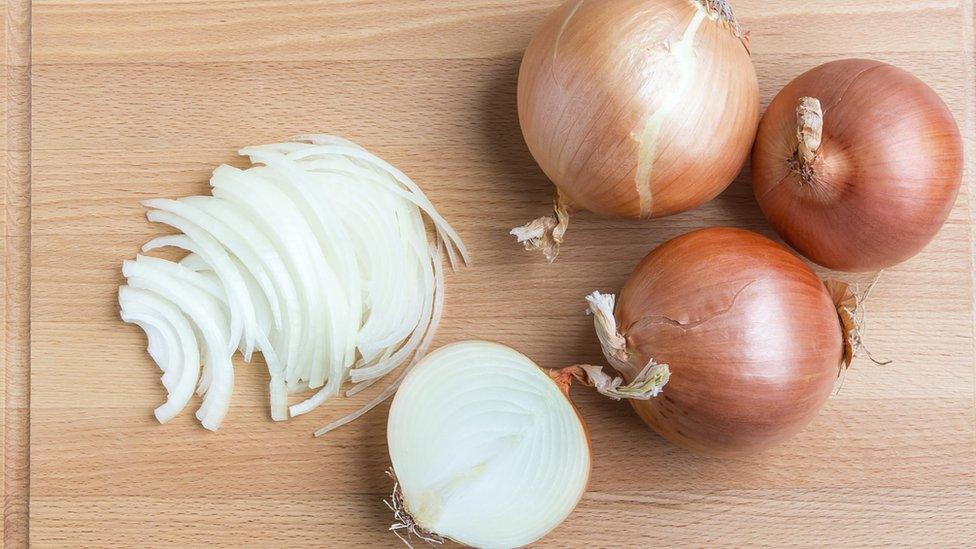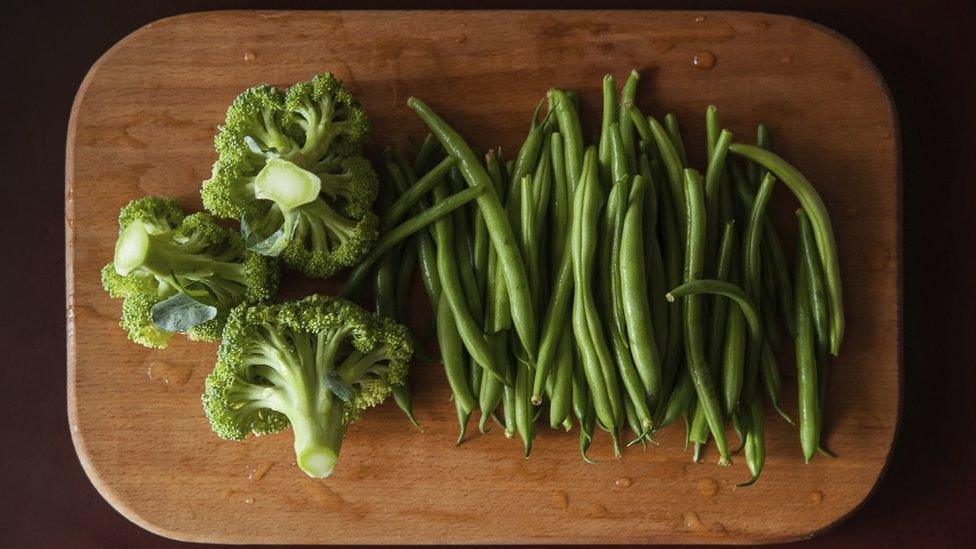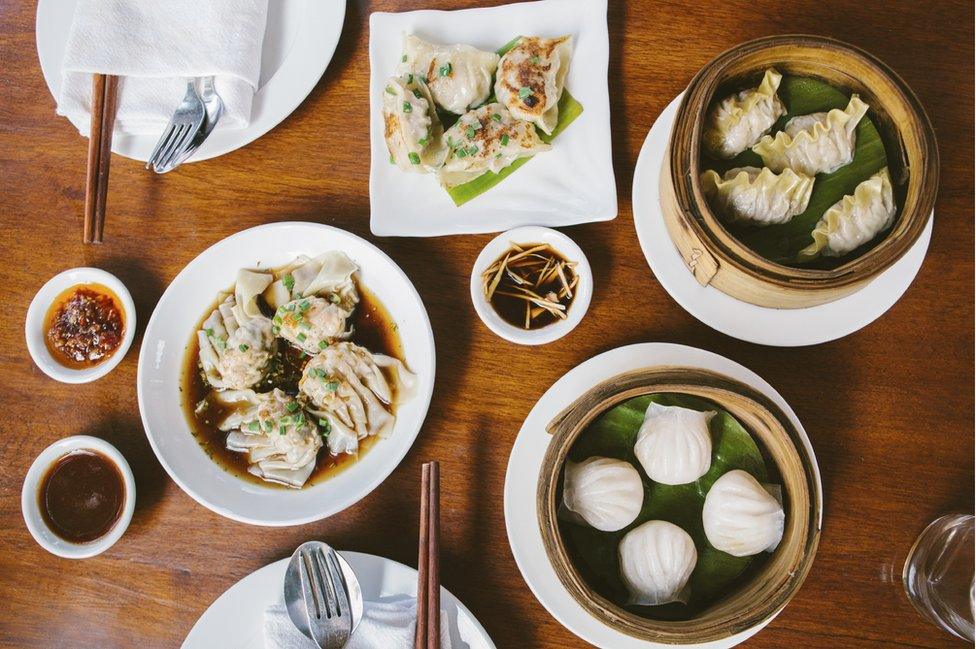A Point of View: 'How I stopped being intolerant of food intolerance'
- Published

Will Self was intolerant about other people's "fussy" eating habits until he developed digestive problems of his own. Then he became even more intolerant.
Three or four years ago I sat down to eat a bowl of the lovely French onion soup my wife had made for me − and kept on going. I had one bowl, then a second, a third, and when eventually I regained some sort of consciousness I saw the entire saucepan had been emptied. Later, my wife told me the recipe was for two litres - or 16 full servings of the stuff. Shortly after that, unsurprisingly, I developed severe stomach pains − pains which felt like a series of contractions, as if I were about to give birth to some bizarre onion-human hybrid.

None of this...
Looking back, it strikes me that there was something annoyingly apt about this regal and medieval over-indulgence − if that wasn't a surfeit of onions, I don't know what is − afflicting me with one of the commonest of contemporary malaises - to wit, irritable bowel syndrome. Yes, I'm afraid so − not that I had the diagnosis confirmed by a medical practitioner, they've obviously got better things to do, but after some dyspeptic Googling there could be no doubt. I was appalled by this development, and when I did visit my GP said to him: "I expect you think I'm just neurotic." He gave a little moue of suppressed agreement then sent me to see the practice nutritionist. "I expect you think I'm just neurotic," I reiterated, and he said: "Well, up to a point − although some recent research seems to prove that certain foods can have a very, um, destabilising effect on some people's digestion."

Irritable Bowel Syndrome (IBS)

Common, long-term condition of the digestive system, which can cause bouts of stomach cramps, bloating, diarrhoea and/or constipation
Symptoms vary between individuals and affect some people more severely than others; they tend to come and go in periods lasting a few days to a few months at a time, often during times of stress or after eating certain foods
IBS is thought to affect up to one in five people at some point in their life, and it usually first develops when a person is between 20 and 30 years of age. Around twice as many women are affected as men
The condition is often lifelong, although it may improve over several years
Source: NHS Choices, external

So it was that I found myself on a highly restricted diet. No onions or garlic, obviously, but also hardly any dairy, no gluten, no beans or pulses, and no brassicas − that's cabbage-type greens, to those of you not similarly obsessed. The diet works, up to point - at any rate, I haven't gone back into labour since I began rigorously observing it. And rigour is my watchword, for, if by chance I do sup an onion-based stock, then… Well, I'll spare you the gory details. Spare you, because I don't wish only to discuss the condition itself, but also the responses of people I encounter − reactions all the more galling (if you'll forgive the pun), because all too often they reveal an attitude I myself still share.

... none of these...
Because before the surfeit of onions I was the first in line to wither at any adult who displayed such infantile pickiness about their food. If I was cooking a dinner, and a guest called in advance to warn me of their "intolerances", I wasn't very tolerant at all. I'd hear them out as they explained how tomatoes made their hands arthritic, or wheat inflated their bellies like barrage balloons, and then I'd deliver a standard lecture: "We live," I'd say, "in a culture super-saturated with fatty concerns − the contemporary British middle class seems to think it can eat its culture, rather than read, watch, or listen to it. Food has become the drug of the bourgeois masses − all we care about is where the next beautifully-prepared meal of ethically-sourced produce is coming from, and since we're never actually hungry, we invent these mysterious 'intolerances' and other dietary requirements in order to season what would otherwise be yet more rich pap with the most toothsome flavouring there is - hunger."
That's right − until I succumbed to the syndrome myself I assumed it was nothing more than mass psychosomosis - the febrile minds of moneyed neurotics affecting their pampered bodies. But if you imagine I've now become, if not tolerant, at least accepting of my fellow-sufferers − think again. It's not so much that I doubt the physiological component in all this tummy rumbling and grumbling, it's more that the social and cultural aspects of the malaise have grown yet still louder in the past half-decade.
In a way it would be a blessed relief were I, in advance of pitching up at someone's house to break bread, to receive a sour remonstrance of the kind I myself used to dish out − but instead I get nothing but sympathy. And more sympathy - and still more sympathy. Indeed, a veritable surfeit of sympathy, such that it triggers a sort of irritable inter-personal syndrome (IIS), which leaves me feeling I may soon become incapable of ever socialising again.
"No gluten?" they'll say, "and only a little dairy?" they'll query, before continuing: "Oh, well, I was going to do boeuf en croute - but that's obviously out of the question now. How about a bourguignon? Oh no no, silly me, that's chock-full of onions and garlic… I do have some fish, though, perhaps I can prepare something simple using that…" And so it will go on and on until I feel like screaming: "Don't you understand! I barely care about bloody food at all anymore − why would I? Yet all you want to do is discuss it with me in excruciating detail." Moreover, if domestic dining contexts can be problematic, public ones are still worse - deciding on which restaurant to eat at has always been the basis for extensive multi-party talks, but once you introduce dietary restrictions these confabs can be prolonged almost indefinitely: "How about Chinese… I mean, rice doesn't have gluten in it, does it…?" which is merely the entree for a main course discussion about Chinese cuisine which may well go on until the pigs arrive home squealing to be barbecued.

...and don't even go there
In many ways IIS is worse than IBS − true, both ultimately confine you, alone, in a small room, but before the former does this you have to discuss food a great deal more than you ever did when you were a sophisticated gourmet or a crass glutton. The fact that perfectly sane folk fall upon any opportunity to talk utter nosh as if they were Circe's drugged swine is surely because so many other, more exalted subjects are quite intractable. The essence of British mores used to be that you didn't discuss politics or religion, and I believe these matters remain quite as contentious as they ever were - however, rather than our questioning minds being suppressed by outmoded convention, they're stifled beneath thick, carbohydrate-laden layers of table talk.
I suppose I should be a little more emollient - after all, it could be argued that comestible conversations are one way we acknowledge physical reality, and hence physical frailty. But the trouble with this view is that it leads - for those of us baby boomers who're rapidly going bust - to what an older friend of mine calls "the organ recital" - namely, that cataloguing of minor ailments which often takes place when you encounter a fellow sufferer.
So, I hope I've put you off ever inviting me to dinner - and I also hope you'll think twice before heralding another's dietary restrictions with a long catalogue of foods and dishes. And if you are indeed a fellow sufferer, I trust this little interlude has provided you with some succour to, um, suck on.

More from the Magazine

Millions of people around the world are giving up gluten. When they stop buying traditional bread and cakes, do they really know what they are doing?

This is an edited transcript of A Point of View, broadcast on Friday on Radio 4 at 20:50 GMT and repeated on Sunday at 08:50 GMT. Catch up on BBC iPlayer
Subscribe to the BBC News Magazine's email newsletter to get articles sent to your inbox.